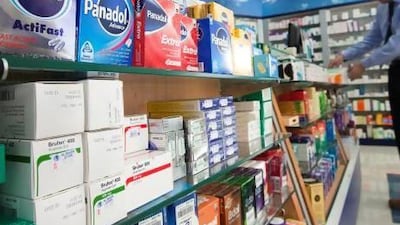ABU DHABI // One sixth of all pharmacies in the emirate have been ranked on the lowest grade in a system aimed at raising standards.
Out of 514 chemists in Abu Dhabi, 82 (16 per cent) were given a D grade during the first phase of Jawda, which means quality in Arabic, introduced by the Health Authority-Abu Dhabi (Haad) last year.
If the pharmacies continue to underperform, they will be named and shamed by the authority.
The system grades pharmacies on an 80-point checklist, which monitors inpatient, outpatient and drugstore infractions. Selling counterfeit, banned or illegal products, poor store conditions and low customer service are some points that would result in a lower grade.
The first phase - known as Cycle 0 - is a silent phase and will give pharmacies time to improve, said Dr Usama Abu Shaban, section head of the health audit for pharmacies at Haad.
Those that scored poorly in the audit have been given a list of recommendations to try to improve their ranking. The next phase - Cycle 1 - will be a follow-up audit on all pharmacies, which will be completed by the end of June.
The findings of Jawda will then be made public.
The idea is to present each pharmacy with a clear grade that has to be visible in the shop for customers to see.
People will then be able to make an educated decision, based on a set of standard rules and regulations, about where they purchase medicine and seek health advice.
In Cycle 0, 117 (or 23 per cent) of the 514 pharmacies received the highest rating of Excellent.
A further 82 (16 per cent) pharmacies received a grade A; 120 (23 per cent) were graded B; and 113 (22 per cent) were given a C grade. The remaining 16 per cent received the D grade.
"The facilities with the ranking D were asked to improve their status and then a follow-up audit was performed," said Dr Shaban.
"If the situation is still not improved with the follow-up audit, a meeting is scheduled with the facility management, including the pharmacist in charge, to discuss the issues.
"If major issues are involved with the facility, the case will be turned over to the licensing committee to impose penalties. In the meeting with the facility, we make sure that the facility and the management understand what they need to do to improve their situation and, ultimately, improve their rank."
Pharmacist Sundus Abdul Rasul, based at Oxford pharmacy on Muroor Road, welcomed the introduction of Jawda, saying she thought it would bring benefits to the industry. However, she said it would mean a lot of hard work for pharmacies trying to compete with each other.
"It will mean improvements," she said. "To have gradings of A, B, C and so on will mean people will know the best pharmacy."
Another pharmacist, Reena Daniel at Elyazia pharmacy, also on Muroor Road, does not feel the introduction of Jawda will make a big difference to the industry.
"I don't know the benefit," she said, adding that she received an A in the initial audit. "The customers don't know these things. Even if it is a D, they don't mind it - as long as they get their medicine, they are fine."
Dr Shaban said that once Cycle 1 is complete, the publication of the rankings will be through a mass media campaign to educate all the stakeholders, including patients and customers, on what the ranking means and how it should reflect on pharmaceutical services.
Jawda was introduced after a wide-ranging audit early last year uncovered almost 15,000 violations, ranging from not having a licensed pharmacist to having out-of-date medication.
One quarter of pharmacies received the lowest grade available at that time.
Cycle 0 of Jawda was completed last year but the results have only been made public now.

